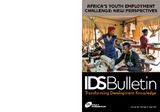Africa’s Youth Employment Challenge: New Perspectives
| dc.contributor.author | Ayele, Seife | |
| dc.contributor.author | Khan, Samir | |
| dc.contributor.author | Sumberg, James | |
| dc.coverage.spatial | Kenya | en |
| dc.coverage.spatial | Ghana | en |
| dc.coverage.spatial | Africa | en |
| dc.coverage.spatial | Tanzania | en |
| dc.date.accessioned | 2017-05-22T08:56:36Z | |
| dc.date.available | 2017-05-22T08:56:36Z | |
| dc.date.issued | 2017-05-22 | |
| dc.identifier.uri | https://opendocs.ids.ac.uk/opendocs/handle/20.500.12413/12990 | |
| dc.description.abstract | Who are the youth and what is the problem? Are entrepreneurship and self-employment the solution? And what about youth aspirations? Such questions are addressed in this issue of the IDS Bulletin, drawing from the literature on how development research affects policy and noting that it says little about how young researchers move into policy engagement. Articles consider the evidence on youth employment policy and interventions, the politics of youth policy, the changing nature of young people’s work, and the promotion of entrepreneurship. They are authored by the ten members of the first cohort of the Matasa Fellows Network (a joint initiative by the MasterCard Foundation and IDS), which has a particular focus on the youth employment challenge in Africa. Youth and employment concepts are not new to development discourse in sub-Saharan Africa but over the last decade interest has increased dramatically, becoming an increasingly important focus for policy, intervention and research throughout the continent (and globally). Fundamental to the Matasa initiative is the proposition tha¬t no matter how innovative or rigorous the research, policy influence will seldom be achieved by adding policy recommendations to a research paper. Rather, influence requires reflection, strategy, planning and tactics, and above all a nuanced understanding of the context and the politics that shape any given policy process. This IDS Bulletin reflects these challenges in Africa and demonstrates how political context shapes youth-related policy. It illustrates the need to critically reflect on the multiple and divergent meanings of work and employment and to re-think interventions that promote entrepreneurship and self-employment. The scope for quality research and effective policy engagement is tremendous. | en |
| dc.language.iso | en | en |
| dc.publisher | Institute of Development Studies | en |
| dc.relation.ispartofseries | IDS Bulletin;48.3 | |
| dc.rights | This is an Open Access article distributed under the terms of the Creative Commons Attribution Non Commercial 4.0 International licence, which permits downloading and sharing provided the original authors and source are credited – but the work is not used for commercial purposes. http://creativecommons.org/licenses/by-nc/4.0/legalcode | en |
| dc.rights.uri | http://creativecommons.org/licenses/by-nc/4.0/ | en |
| dc.subject | Agriculture | en |
| dc.subject | Children and Youth | en |
| dc.subject | Sexuality and Development | en |
| dc.subject | Work and Labour | en |
| dc.title | Africa’s Youth Employment Challenge: New Perspectives | en |
| dc.type | Series paper (IDS) | en |
| dc.rights.holder | Institute of Development Studies | en |
| dc.identifier.team | Rural Futures | en |
| dc.identifier.doi | 10.19088/1968-2017.121 | |
| dcterms.dateAccepted | 2017-05-22 | |
| rioxxterms.funder | Default funder | en |
| rioxxterms.identifier.project | Default project | en |
| rioxxterms.version | VoR | en |
| rioxxterms.funder.project | c941507f-fd0b-4fc3-9822-4b2132f61a1d | en |
Files in this item
This item appears in the following Collection(s)
Except where otherwise noted, this item's license is described as This is an Open Access article distributed under the terms of the Creative Commons Attribution Non Commercial 4.0 International licence, which permits downloading and sharing provided the original authors and source are credited – but the work is not used for commercial purposes. http://creativecommons.org/licenses/by-nc/4.0/legalcode


